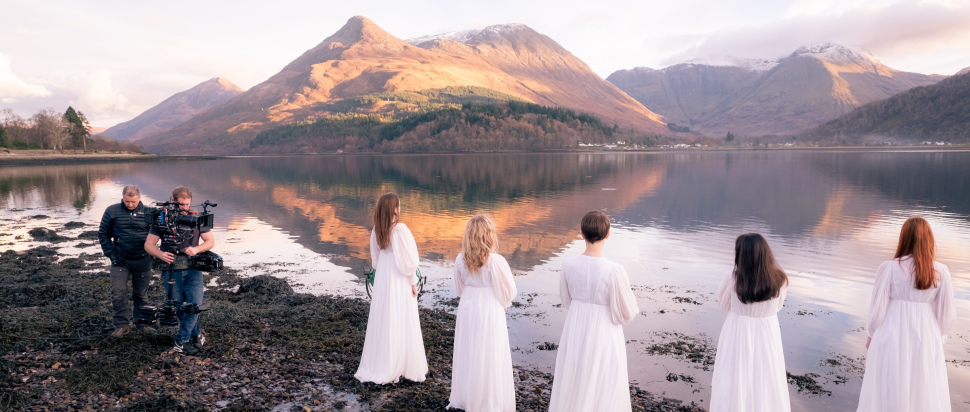On the set of Our Ladies with author Alan Warner
Back in 2018, the film adaptation of Alan Warner's The Sopranos was filming in Edinburgh. Three years later, the film – now titled Our Ladies – finally reaches Scottish cinemas. Here's our on-set chat with the author, over a bracingly expensive whisky
It’s a bitterly cold November morning in Edinburgh and two young actors – Rona Morison and Marli Siu – are wearing mini-skirts and chewing on ice cubes on Victoria Street. However, this isn’t the act of masochism it first appears. Rather, it’s an old trick of the movie trade that allows actors to perform outside on freezing days like this one without leaving puffs of misty breath with every line of dialogue.
The film in question is Michael Caton-Jones’s Our Ladies, although no one is referring to it as such today. The film’s working title is The Sopranos, same as the 1998 book on which it’s based. It’s a rambunctious comic yarn about female friendship and small-town life, and centres on five catholic school girls from a working-class port town getting up to mischief in Auld Reekie while visiting the city for a school choir competition. But, for obvious reasons, the original title had to be 86ed, save film bros confusing it for a gangster flick.
The Skinny aren’t the only visitors on set today. Alan Warner, the author of The Sopranos, has flown in from his home in Spain to see how this long-in-the-works adaptation is progressing. Caton-Jones needn’t worry about writer interference, however. Warner is keener to grab a whisky at one of his old haunts – The Bow Bar, a few doors down from where the film is shooting – than look over the director’s shoulder.
When we sit down to join the Scottish author with a couple of the bracingly expensive Orkney single malts he suggests we buy for our round, Warner explains that in the early days of the project (Caton-Jones bought the film rights in 1998, just as it was publishing), he had planned to write the script himself, but struggled with its structure. “I found it very difficult,” he admits. Veteran Scottish screenwriter Alan Sharp, whose credits include masterpieces like Night Moves and The Hired Hand as well as Caton-Jones's Rob Roy, took over and whipped the script into shape, but it still wasn’t right. “Alan’s script had a great sense of how to do it visually, but the dialogue maybe wasn't that crisp.”
Another spanner in the works was studio interference. “The studio had different ideas about how the film should be done,” he explains. “There was a lot of money flying about in those days and big star names were mentioned to come into the film. I think Penélope Cruz was mentioned at some point.” Warner could have lived with any changes apart from one: the setting. “And that was the first thing that happened in Hollywood, of course,” he says. “They said, ‘Oh, what if it was set in Santa Barbara or Miami?’ But Michael, being Scottish, knew it couldn't go that way. And he stuck by it for 20 years.”
Warner has been pretty hands-off during this final pass of the script by Caton-Jones, and he’s happy with that. Perhaps this relaxed attitude is because this isn’t Warner’s first rodeo. His 1995 debut, Morvern Callar, was made into a movie in 2002 by Lynne Ramsay. “I've always been of the position you've got to let these film dudes do what they want,” says Warner. “People like Michael and Lynne, they're dreamers; they want to tell stories in images. So you've got to just let them run with it.”
It’s interesting that of Warner's nine novels to date, it’s these two focused on young women that have attracted filmmakers. Warner doesn’t put the success of these two books down to any innate talent for writing women characters, however. “After I wrote Morvern Callar, there was a lot of ‘Oh, you do women characters so well.’ But it's a bit like being told you're better kicking with your left foot than your right foot. You just go, “Oh, right.” You just accept it. You just hope whoever the character is, male or female, they’re convincing.” He reckons this is mostly down to graft: “It's crafting and reworking that does it, it's not as if I have some amazing insight into female psychology. It takes a lot of work.”
With Morvern Callar and now The Sopranos immortalised on film, Warner can lay claim to being one of Scotland’s most filmed living novelists (behind Irvine Welsh and, of course, J.K. Rowling). It’s a fact that has him a bit miffed. “In any normal European culture, be it Sweden, France, Spain... if they have famous writers, they make films out of their books. In Scotland, we don't do that for some reason.” We’re starting to get the impression this topic is something of a hobby horse for Warner. “Maybe I’m an arty moaner,” he says, “but you’d think it would just be natural to have a few of the famous novels made into films – I'm talking work by George Douglas Brown, James Kelman, Janice Galloway – but then they shoot my shit. Why two of my books and not one by those masters? You can't explain it really.”
Our Ladies is released in UK cinemas by Sony on 27 Aug
Alan Warner appears at Edinburgh International Book Festival, 19 Aug, 11.30am, tickets £12-14 or online, PWYC
